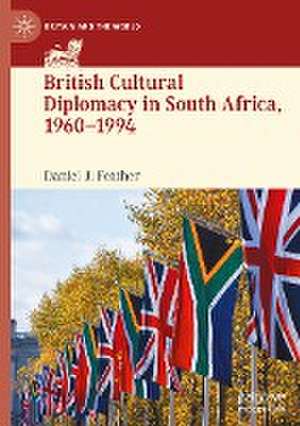British Cultural Diplomacy in South Africa, 1960–1994: Britain and the World
Autor Daniel J. Featheren Limba Engleză Hardback – 8 feb 2024
Din seria Britain and the World
-
 Preț: 261.24 lei
Preț: 261.24 lei -
 Preț: 384.31 lei
Preț: 384.31 lei -
 Preț: 455.89 lei
Preț: 455.89 lei - 18%
 Preț: 785.00 lei
Preț: 785.00 lei - 15%
 Preț: 499.92 lei
Preț: 499.92 lei -
 Preț: 394.51 lei
Preț: 394.51 lei - 15%
 Preț: 695.85 lei
Preț: 695.85 lei -
 Preț: 391.61 lei
Preț: 391.61 lei -
 Preț: 391.61 lei
Preț: 391.61 lei - 18%
 Preț: 784.79 lei
Preț: 784.79 lei - 15%
 Preț: 584.43 lei
Preț: 584.43 lei - 18%
 Preț: 723.56 lei
Preț: 723.56 lei -
 Preț: 387.75 lei
Preț: 387.75 lei -
 Preț: 383.33 lei
Preț: 383.33 lei -
 Preț: 326.64 lei
Preț: 326.64 lei -
 Preț: 388.72 lei
Preț: 388.72 lei - 15%
 Preț: 643.84 lei
Preț: 643.84 lei - 18%
 Preț: 782.42 lei
Preț: 782.42 lei - 15%
 Preț: 638.90 lei
Preț: 638.90 lei - 8%
 Preț: 591.14 lei
Preț: 591.14 lei -
 Preț: 399.29 lei
Preț: 399.29 lei -
 Preț: 390.63 lei
Preț: 390.63 lei - 8%
 Preț: 484.59 lei
Preț: 484.59 lei - 15%
 Preț: 585.26 lei
Preț: 585.26 lei -
 Preț: 391.61 lei
Preț: 391.61 lei -
 Preț: 276.13 lei
Preț: 276.13 lei - 15%
 Preț: 646.62 lei
Preț: 646.62 lei - 15%
 Preț: 527.15 lei
Preț: 527.15 lei -
 Preț: 384.86 lei
Preț: 384.86 lei - 18%
 Preț: 789.35 lei
Preț: 789.35 lei -
 Preț: 391.61 lei
Preț: 391.61 lei - 18%
 Preț: 784.61 lei
Preț: 784.61 lei -
 Preț: 242.17 lei
Preț: 242.17 lei -
 Preț: 385.84 lei
Preț: 385.84 lei -
 Preț: 394.51 lei
Preț: 394.51 lei -
 Preț: 398.53 lei
Preț: 398.53 lei - 15%
 Preț: 647.40 lei
Preț: 647.40 lei - 15%
 Preț: 642.51 lei
Preț: 642.51 lei
Preț: 731.73 lei
Preț vechi: 892.35 lei
-18% Nou
Puncte Express: 1098
Preț estimativ în valută:
140.02€ • 152.71$ • 118.06£
140.02€ • 152.71$ • 118.06£
Carte tipărită la comandă
Livrare economică 24 aprilie-08 mai
Preluare comenzi: 021 569.72.76
Specificații
ISBN-13: 9783031494376
ISBN-10: 3031494377
Pagini: 332
Ilustrații: XI, 332 p. 2 illus.
Dimensiuni: 148 x 210 mm
Greutate: 0.56 kg
Ediția:1st ed. 2023
Editura: Springer International Publishing
Colecția Palgrave Macmillan
Seria Britain and the World
Locul publicării:Cham, Switzerland
ISBN-10: 3031494377
Pagini: 332
Ilustrații: XI, 332 p. 2 illus.
Dimensiuni: 148 x 210 mm
Greutate: 0.56 kg
Ediția:1st ed. 2023
Editura: Springer International Publishing
Colecția Palgrave Macmillan
Seria Britain and the World
Locul publicării:Cham, Switzerland
Cuprins
Chapter 1: Introduction.- Part I. Educational Policy.- Chapter 2: Racialised Educational Diplomacy: Scholarships and Race, 1960-1964.- Chapter 3: UK-South African Educational Cooperation in the Years of ‘High’ Apartheid, 1964 to 1979.-Chapter 4: Forging Ties with the ‘Successor Generation’, 1979 to 1994.-Part 2: Cultural and Sporting Contact.-Chapter 5: The British Broadcasting Company: Asset or Hindrance to the Perception of the UK in Apartheid South Africa?.-Chapter 6: British ‘Cultural Manifestations’ in South Africa, 1960 to 1994.-Chapter 7: UK Policy Towards Sporting Contact with South Africa, 1960 to 1977.-Chapter 8: UK Policy Towards Sporting Contact with South Africa, 1977 to 1994.-Chapter 9: Conclusion
Notă biografică
Daniel J. Feather is a Senior Lecturer in History at Liverpool John Moores University, in the UK. He has published articles in leading international and diplomatic history journals and obtained multiple research grants from bodies such as the Royal Historical Society and British Academy. Daniel is a British Council Research Partner and is also on the editorial board of AM Digital’s Apartheid South Africa, 1981-1994 digitisation project.
Textul de pe ultima copertă
Daniel J. Feather is a Senior Lecturer in History at Liverpool John Moores University, in the UK. He has published articles in leading international and diplomatic history journals and obtained multiple research grants from bodies such as the Royal Historical Society and British Academy. Daniel is a British Council Research Partner and is also on the editorial board of AM Digital’s Apartheid South Africa, 1981-1994 digitisation project.
This book analyses the British government’s use of cultural diplomacy in South Africa from 1960 to 1994. Previously, scholarship on UK-South African relations has focussed mainly on political, economic, or military links; this book makes an important and original intervention by emphasising how the British government sought to use cultural ties as part of its diplomacy in South Africa. The book also highlights the controversy these links generated owing to broader international efforts to ostracise South Africa owing to the racist apartheid system in the country at the time. By examining British policy towards educational exchanges, performing arts tours, radio and television broadcasts, and sporting contact, this book provides a dynamic case study from which to analyse Britain’s use of cultural diplomacy during a period of relative decline, while also adding a new layer to the well-established literature on the UK-South African special relationship.
Caracteristici
Examines the use of soft power to maintain influence in sensitive and contentious diplomatic contexts Offers interdisciplinary insights for those researching diplomatic history, imperialism, and international relations Draws upon sources previously unused by historians
